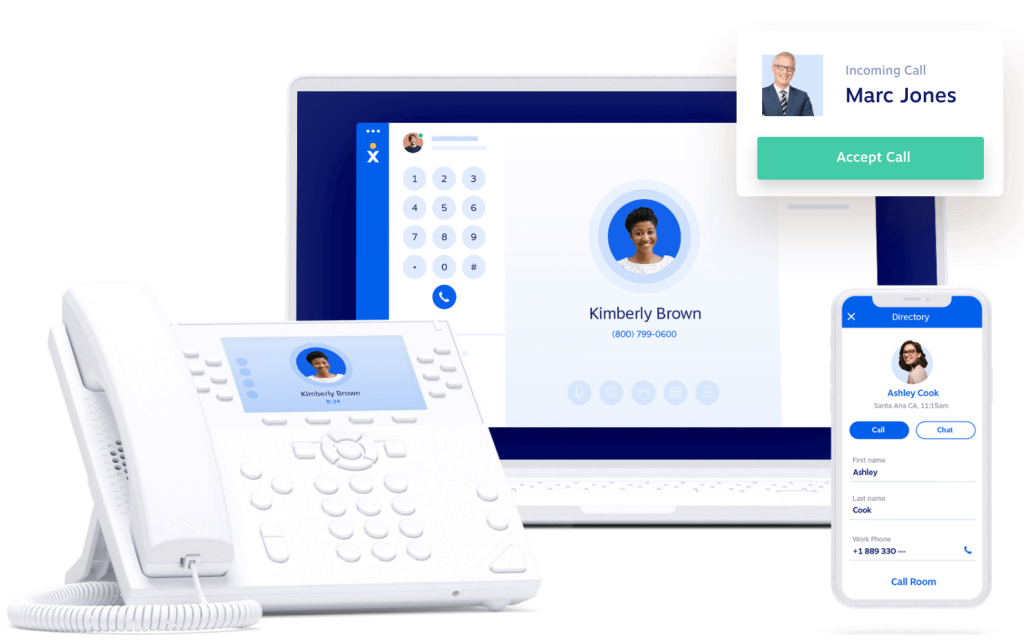
What Is a VoIP Phone & How Does It Work?
A VoIP phone is any phone that uses an internet connection to make and receive calls instead of traditional landlines. Instead of a traditional “hard-wired” phone that uses directly connected copper wires to provide telephone service, a VoIP phone gives you greater mobility, interoperability, and connectivity. What Is a VoIP Phone & How Does It Work?
The best part? A VoIP phone isn’t restricted to a specific desk location. You can use an app to make calls from any desktop computer or mobile device.
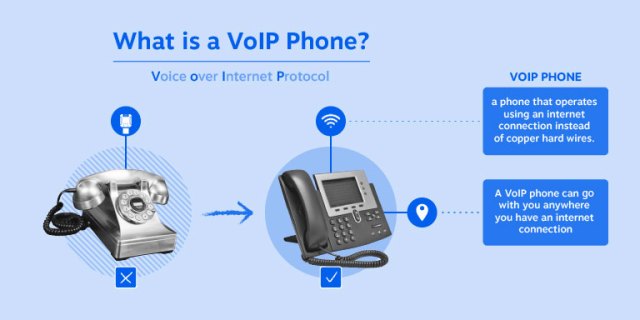
VoIP vs. Traditional Phone Systems
The biggest difference between a VoIP phone and a traditional landline telephone is that the local telephone provider installs a landline phone in a physical location.
On the other hand, a VoIP phone makes and receives calls over the internet and is not limited to a specific location or provider.
This way, you can use that phone number from anywhere you have internet access.
Because of this, there are two big differences in functionality between VoIP phones and traditional phones. The first is that a VoIP phone will work in any location. As long as you have an internet connection, you’ll be able to make and receive calls without being tied to one place.
Get Nextiva VoIP service. Simple. Affordable.
Get your business phone, messages, video meetings, contact management and notes–integrated in ONE powerful app.
Here’s a detailed comparison between VoIP and landline phones.
Functionality |
VoIP phones |
Landline phones |
|---|---|---|
Phone calls (PSTN) |
Yes |
Yes |
Nationwide long-distance |
Included |
Optional |
User-to-user calls |
Yes |
PBX required |
Caller ID |
Yes |
Yes |
Call waiting |
Yes |
Yes |
Ease of setup |
★★★★★ |
★★★ |
Requires internet |
Yes, 100 Kbps per line |
No |
Wireless |
Wi-Fi, DECT, and Bluetooth headsets are available |
DECT and Bluetooth headsets are available |
Reliability in internet/power outages |
Calls can be routed to another number or voicemail. |
Calls drop or are routed to voicemail. |
Technology |
IP telephony (SIP, TLS, and SRTP)HD audio quality |
Analog voice signals |
Call quality |
★★★★★ |
★★★★ |
Setup cost |
$0 |
$110 per jack |
Monthly cost |
$20–35 |
$50 |
Activation fee |
$0 |
$50 |
Auto attendant |
Included |
PBX required |
Phone number privacy |
Included |
Varies |
Phone number changes |
Included |
$27 |
Hunt groups |
Included |
PBX required |
Conferencing |
Included |
Three-Way Calling |
Call routing |
Included |
$9.95/mo |
Call queuing |
Add-on |
Add-on |
Remote work compatible |
Yes, softphone apps |
Call forwarding |
Call encryption |
Yes (TLS & SRTP) |
No |
International dialing |
MX: $0.16/minUK: $0.01/minJP: $0.05/min |
MX: $0.54/minUK: $1.21/minJP: $1.62/min |
Business voicemail |
Included |
$13.95/mo |
Integrations (CRM, text messaging, surveys) |
Yes |
No |
How Does a VoIP Phone Work? What Is a VoIP Phone & How Does It Work?
A VoIP phone operates by using digital signals to authenticate and establish phone calls. VoIP phones associate themselves with a VoIP service provider. The process entails the following steps:
- A VoIP phone “registers” itself with a VoIP phone service provider.
- The VoIP provider sets up and manages incoming and outbound calls.
- When a call is placed from a VoIP phone, the provider sets the call up over the public switched telephone network (PSTN).
- When a user talks on a VoIP phone, the handset converts and compresses the sound into data packets and sends them instantly to the VoIP provider.
- Depending on the other party’s phone provider, the provider relays the data packets or converts the sounds back into analog audio.
All these steps take less than a few seconds to establish a call, but the conversation happens in real-time without delay once it’s connected.
So, Why VoIP Phones? What Is a VoIP Phone & How Does It Work?
Historically, the local phone company had to connect each and every phone number to a phone handset. A technician had to run a physical line from a neighborhood terminal to your building and wire up the telephone network interface.
In the 90s, businesses wanted to manage phone features themselves, especially with the rise of call centers as a business function. So they managed the phones in the office using specialized equipment known as a Private Branch Exchange (PBX). One of the PBX limitations was that operators still needed to purchase lines and numbers from the phone company.
Less than a decade later, today’s phone system began to take shape.
Communication providers like Nextiva became the industry standard for business phone systems. Instead of purchasing expensive telephone equipment with proprietary phones, the industry evolved to provide reliable phone service using interoperable equipment to connect to the PSTN.
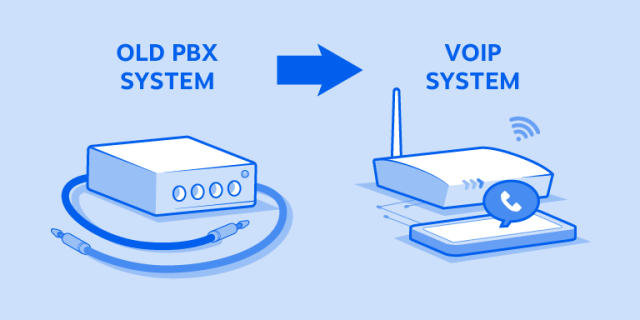
Today’s VoIP phone features offer many more features and higher reliability than those available on old PBX systems.
Since VoIP phones work by handling telephone calls from the internet, or the cloud, the technology employs existing computer network cabling or Wi-Fi to access telephone networks.
Now, with modern technology, VoIP phones work by converting analog voice signals into digital signals over your broadband internet connection. The easy way to say it? VoIP uses the internet to make and receive calls rather than traditional landlines.
All you need is an internet connection and a business VoIP provider to place and connect the calls.
VoIP technology uses existing computer network cabling or Wi-Fi to access telephone networks.
No more wires or boxes are needed to use your VoIP business phone service! Now you can take a call from anywhere you have internet — even from an app on your computer — and your phone number can stay the same as before, so you won’t have to change it.
So whichever telephone device your company chooses, you can connect it to the VoIP phone system simply and easily. Just plug the phones in and have your tech team configure the system to best suit your particular needs.
Sometimes, businesses prefer to retrofit an existing PBX to a cloud-based system instead of entirely switching to a VoIP phone system. This type of migration would rely on Session Internet Protocol, known as SIP trunking, to connect phone calls over IP networks.
Benefits of VoIP Phone Systems
VoIP phone systems offer many benefits, but the most popular reason why they’re popular is that you can make and receive phone calls from any high-speed internet connection. No more being tethered to a desk to work. You now have virtual phone numbers to protect your privacy. Use Nextiva’s business phone app to receive calls from your desktop computer or any mobile-compatible device with our mobile app.
Businesses like VoIP because it’s easier to scale (vs. traditional landlines) and add phone numbers as your team grows. Why? Because you don’t need technicians to come out to install physical phone lines. VoIP has easy installation — you only need an existing broadband connection and VoIP provider.
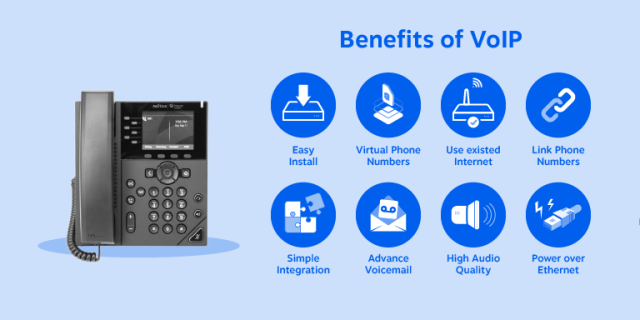
Other popular VoIP features for business include integration with existing software applications, like Microsoft Teams integrations. Advanced voicemail features like visual voicemail and voicemail transcriptions are also sent to your email.
Lots of businesses like the low-cost approach to maintenance. Not only do you not need your own PBX or server since the data is hosted and managed by your VoIP provider, but you will get automatic software updates, so no one needs to monitor your phone system.
VoIP phones provide high-definition sound quality (twice that of traditional landlines). And your VoIP phone system can be set up for Power over Ethernet (PoE). That feature means they get power over their Ethernet network cable instead of a traditional power adapter. This results in fewer plugs that can get knocked out of power strips around the office.
VoIP Phone Equipment
There are two main types of VoIP phones: wired phones and softphones. You may need only one type to suit your needs, or your business may operate best when you combine a few different types.
VoIP hard phones are physical phones that you can see, touch, and feel. On the other hand, softphones are basically apps you use on a computer or mobile device to accept and make calls.
If you choose Nextiva for your cloud phone system, you will get a softphone included in your package. Nextiva also offers a variety of certified VoIP phones and equipment guaranteed to work for your needs.
Nextiva has assembled a chart showing the most popular VoIP phones on the market to make the decision process easy. All of these models have been tested and reviewed, and each has been benchmarked to the highest industry standards.
Remember that countless other models are available (some with either more advanced features or additional lines). Here’s a more comprehensive list of the best business VoIP phones.
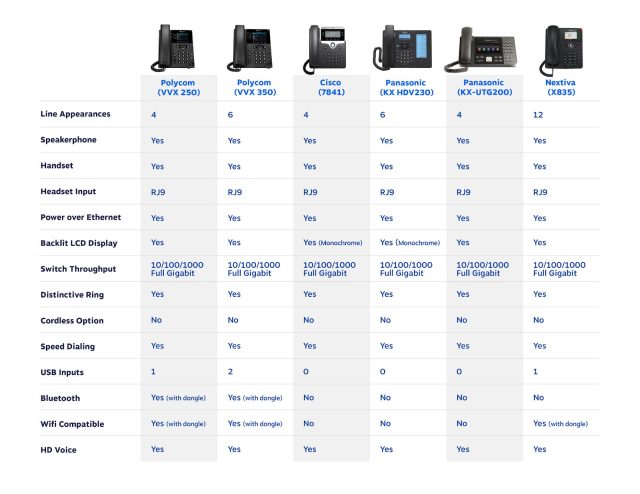
Best Picks for VoIP Phones
- Poly VVX 250: A high-quality, four-line, IP phone ideal for knowledge workers who need to meet today’s modern business environment demands and the ability to multitask or handle multiple calls. Pricing: $160
- Nextiva X-885: A sleek, twelve-line, color, IP phone ideal for executives and receptionists. It has a multi-page approach to provide twelve additional programmable keys. Pricing: $190
- Yealink T57W: Designed for busy executives and professionals, the Yealink T57W is an easy-to-use business phone with an adjustable 7-inch touch screen. With integrated Bluetooth 4.2 and dual-band 2.4G/5G Wi-Fi, the T57W IP Phone allows for multiple wireless connection options.
Pricing: $310
A conference phone differs from a desktop phone in that it is optimized for broadcasting high-quality sound in a group setting like a conference room because it has an omnidirectional microphone configuration.
However, there isn’t a big functional difference between desktop and conference phones. You can easily use the other if you learn how to use one.
The models shown below are among the most popular VoIP phones in the market. Each comes with standard features like speakerphones and speed dialing. For information on additional features and capabilities, refer to the chart below.
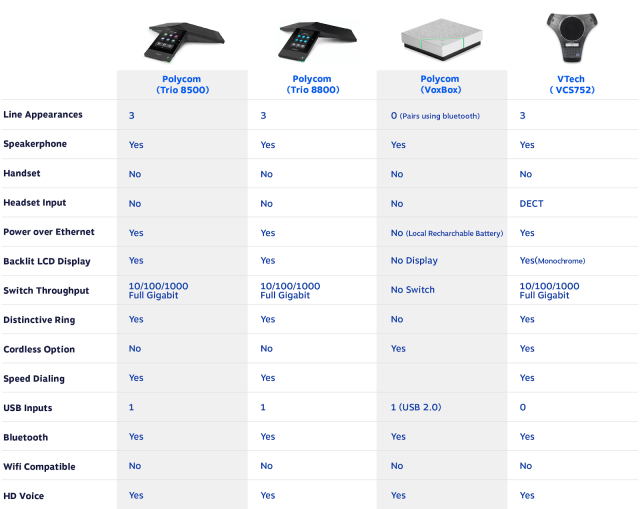
Best Picks for VoIP Conference Phones
- Snom C520: A high-quality conference phone with 2 additional rechargeable wireless microphones to extend the vocal range and built-in noise reduction that is ideal for any conference room. Pricing: $389
- Poly Trio 8500: A powerful conference phone with a color LCD touch screen, 14-foot optimal vocal pickup range, plus USB and Bluetooth connectivity. The Poly Trio 8500 is ideal for medium and large conference rooms. Pricing: $740
- Poly Trio 8800: A powerful conference phone with a color LCD touch screen, a 20-foot optimal vocal pickup range, Wi-Fi, USB, and Bluetooth connectivity. The Poly Trio 8800 is ideal for large and extra-large conference rooms. Pricing: $900
What Type of VoIP Phone Does Your Business Need?
In the end, you cannot go wrong with any of these popular devices. You’ll notice that each offers the features you would expect from a phone system.
Here are the primary requirements to consider before choosing a device:
Consider the brand reputation.
Are there names you trust more than others? Think about longevity and past performance.
- Poly is the global leader in effective business communication with colleagues, partners, customers, and prospects. You can’t look at a serious VoIP solution without including its product line in your decision-making process.
- Cisco is a big name in business networks and internet infrastructure and another lead player in the VoIP hardware realm.
- Panasonic is one of the world’s leading VoIP phone business systems innovators. Their reputation for making quality electronic devices goes back decades.
- VTech is the world’s largest manufacturer of cordless phones and is well known for its electronic educational toys.
Do you use headsets?
What type of connectors do they have? An RJ-9 is a familiar type of connector for telephones but is less popular. Today’s headsets use USB for connectivity. If you need Bluetooth, then make sure your device supports it. Some devices require a USB-to-Bluetooth dongle that might not be included.









